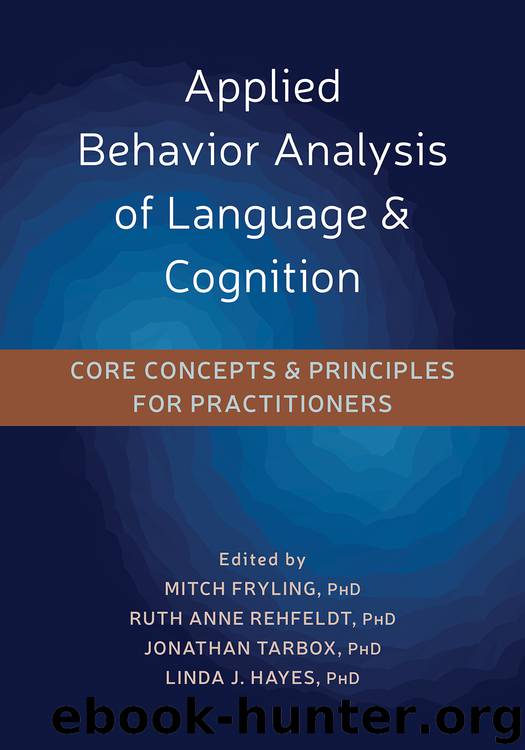Applied Behavior Analysis of Language and Cognition by Mitch Fryling

Author:Mitch Fryling
Language: eng
Format: epub
Tags: Applied Behavior Analysis;ABA;Verbal Behavior;Language;Cognition;BCBA;Board Certified Behavior Analysts;Autism;RFT;Relational Frame Theory;Radical Behaviorism;Interbehaviorism;Verbal Behavior;Applied Behavior Analysis;Derived Relational Responding;Stimulus Equivalence;Basic Principles;Language
Publisher: New Harbinger Publications
Published: 2020-01-16T19:01:52+00:00
Figure 11.7 Frame of hierarchy.
Deictic
Deictic relational frames involve responding to a stimulus in terms of its perspective to the speaker themself. Deictic responding appears to be central to perspective taking and is often under the contextual control of pronouns, such as I/you, me/she, us/them, and so on. Perspective taking can also include spatial relations of here/there and temporal relations of now/then, since one is always speaking here and now and others are always listening there and then. Given that deictic relational responding requires some form of perspective taking by the speaker, this pattern of relational framing is essential for the development of an understanding that different people see different things. Although this seems like a relatively simple skill, it is often deficient in individuals with disabilities such as autism, Down syndrome, and other developmental and intellectual disabilities. Therefore, clinicians can teach deictic relational responding to these individuals in an effort to facilitate the development of many perspective-taking skills.
Studies have reported a relationship between an individual’s perspective-taking abilities and intellectual functioning (Gore, Barnes-Holmes, & Murphy, 2010). Individuals who respond with low accuracy to perspective-taking tasks typically have lower intellectual functioning and verbal ability. Other studies have found that those with schizophrenia (Villatte, Monestès, McHugh, Freixa i Baqué, & Loas, 2010) and social anhedonia (Vilardaga, Estévez, Levin, & Hayes, 2012; Villatte, Monestès, McHugh, Freixa i Baqué, & Loas, 2008) demonstrate difficulty responding in accordance with deictic relations, suggesting a potential connection between the two. Several studies have reported successful results in terms of establishing this type of responding in typically developed individuals (e.g., Barnes-Holmes, Barnes-Holmes, & McHugh, 2004; Heagle & Rehfeldt, 2006; Weil, Hayes, & Capurro, 2011) as well as those with neurodevelopmental disabilities (e.g., Belisle et al., 2016; Jackson, Mendoza, & Adams, 2014; Rehfeldt, Dillen, Ziomek, & Kowalchuk, 2007) and schizophrenia (O’Neill & Weil, 2014). Taken together, results from these studies suggest that deictic relating is amenable to training via multiple exemplar training. Research on deictic relations could benefit from additional studies establishing single and double reversals in nontypically developed individuals, especially in terms of here/there and then/now relations. (See chapter 17 for more on perspective taking.)
Download
This site does not store any files on its server. We only index and link to content provided by other sites. Please contact the content providers to delete copyright contents if any and email us, we'll remove relevant links or contents immediately.
The Art of Coaching Workbook by Elena Aguilar(51201)
Trainspotting by Irvine Welsh(21668)
Twilight of the Idols With the Antichrist and Ecce Homo by Friedrich Nietzsche(18635)
Fangirl by Rainbow Rowell(9254)
Periodization Training for Sports by Tudor Bompa(8274)
Change Your Questions, Change Your Life by Marilee Adams(7783)
This Is How You Lose Her by Junot Diaz(6889)
Asking the Right Questions: A Guide to Critical Thinking by M. Neil Browne & Stuart M. Keeley(5776)
Grit by Angela Duckworth(5615)
Red Sparrow by Jason Matthews(5476)
Paper Towns by Green John(5191)
Room 212 by Kate Stewart(5125)
Ken Follett - World without end by Ken Follett(4734)
Housekeeping by Marilynne Robinson(4449)
The Sports Rules Book by Human Kinetics(4388)
Papillon (English) by Henri Charrière(4274)
Double Down (Diary of a Wimpy Kid Book 11) by Jeff Kinney(4273)
The Motorcycle Diaries by Ernesto Che Guevara(4103)
Exercise Technique Manual for Resistance Training by National Strength & Conditioning Association(4073)
